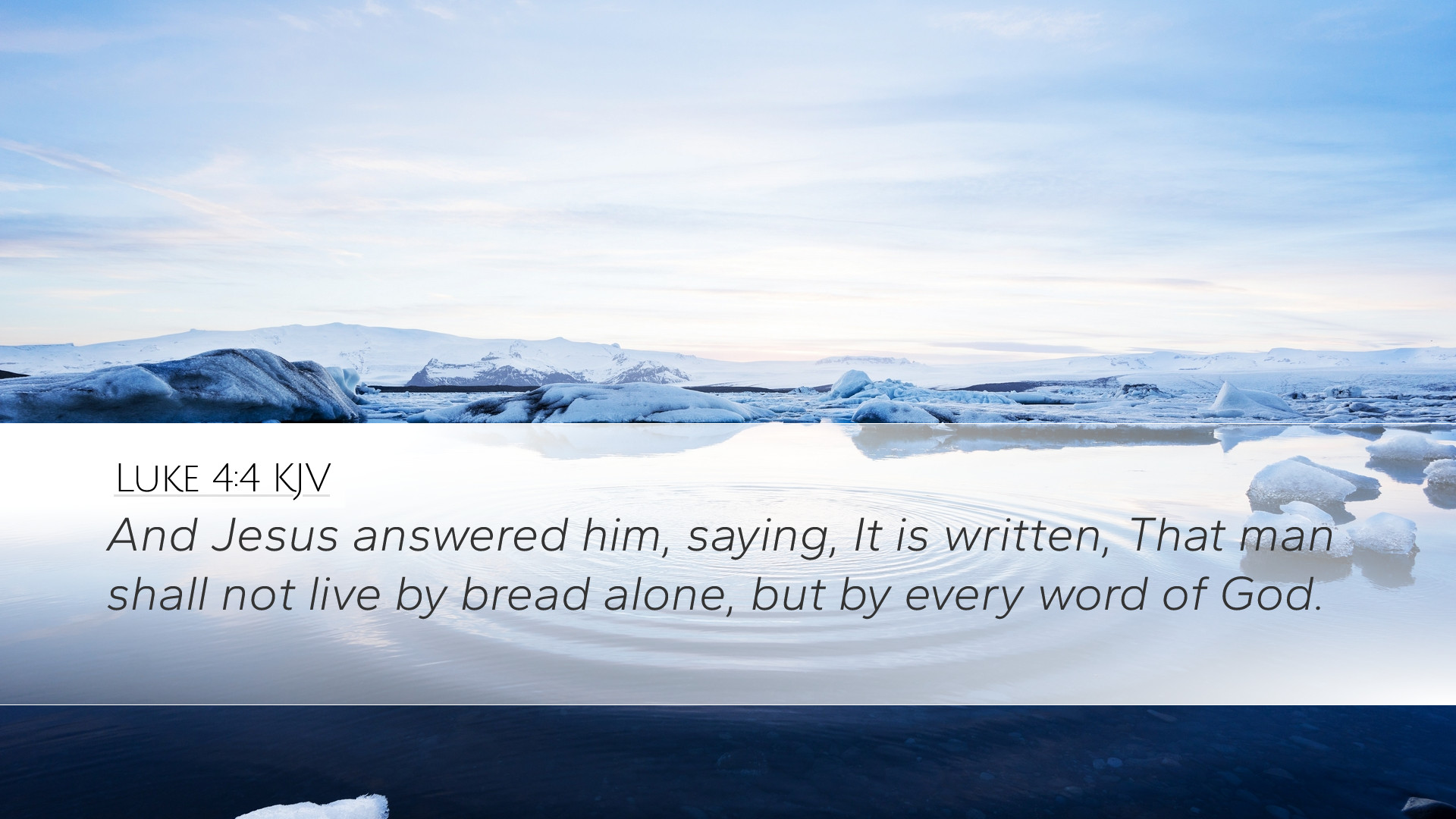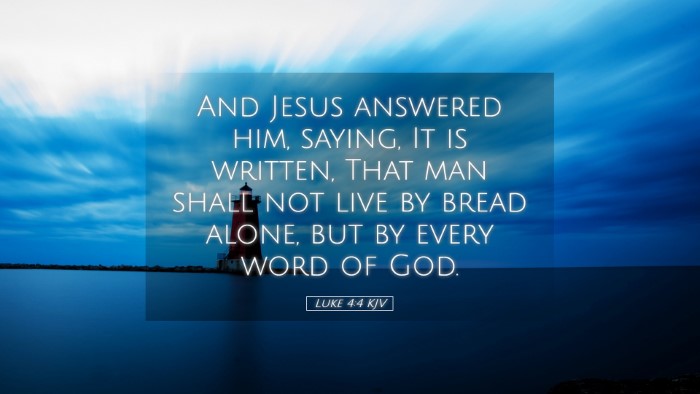Commentary on Luke 4:4
Bible Verse: Luke 4:4 - "And Jesus answered him, saying, It is written, That man shall not live by bread alone, but by every word of God."
Introduction
This verse occurs during the temptation of Jesus in the wilderness, an event rich in theological significance and insight. It highlights the essential reliance on divine revelation over physical sustenance, setting a foundation for understanding spiritual nourishment. The commentaries from notable theologians such as Matthew Henry, Albert Barnes, and Adam Clarke provide depth to this passage, offering valuable perspectives for pastors, scholars, and students of theology.
Contextual Background
The context of this verse is vital. Following His baptism, Jesus is led into the wilderness by the Holy Spirit to be tempted by the devil (Luke 4:1-2). This scenario illustrates the profound struggle between spiritual authority and worldly temptation. The quote from Deuteronomy 8:3 emphasizes God's provision and the importance of spiritual sustenance.
Thematic Insights
This verse unveils several significant themes:
- The Primacy of God's Word: Jesus quoted this scripture to affirm that spiritual nourishment surpasses physical needs, suggesting a holistic view of life that prioritizes God's commandments.
- Human Dependency: The reference to 'man' implies innate dependence on divine sustenance, illustrating that human existence is not fulfilled by material means alone.
- Resisting Temptation: Jesus' response serves as a template for overcoming temptations, relying on scripture as a powerful weapon against spiritual adversaries.
Matthew Henry's Insights
Matthew Henry emphasizes Jesus’ profound understanding of dependence on God’s word. He notes:
- Jesus' quotation from Deuteronomy signifies the importance of spiritual application over mere physical existence.
- The use of "bread" as a metaphor encapsulates all forms of earthly sustenance, underscoring that true life is derived from divine truth.
- This moment illuminates the broader theme of the divine sustaining power through God's promises and provisions.
Albert Barnes' Analysis
Albert Barnes offers an exegetical perspective on the text:
- He delineates that the phrase 'man shall not live by bread alone' communicates the necessity of divine truth as life’s sustenance.
- Barnes posits that the adversities faced, such as hunger, are designed to redirect focus toward reliance on God’s word, reinforcing the idea that physical needs should not dominate the spiritual journey.
- His commentary stresses that the true essence of life is found through obedience to God’s instructions, illuminating the path for believers in their spiritual walk.
Adam Clarke's Perspective
Adam Clarke brings a rich contextual analysis:
- Clarke interprets the 'word of God' as not only the written scriptures but also the living word embodied in Christ Himself, suggesting a dual aspect of nourishment.
- He highlights the significance of this phrase in relation to the Israelites’ experience in the wilderness, indicating that divine sustenance is not merely about survival but thriving spiritually.
- Clarke also affirms that this teaching serves as a cornerstone to understanding the broader narrative of reliance on God during times of trials and temptations.
Theological Reflections
From these commentaries, several theological reflections emerge:
- Scriptural Authority: There is a profound emphasis on the authority of scripture; it acts as both a guide and source of strength.
- Spiritual vs. Physical: The dichotomy between spiritual fulfillment and physical needs suggests a deeper truth about human existence and purpose.
- Christological Implications: This verse reveals Christ not only as the King but also as the sustainer, reinforcing His role as the fulfillment of Old Testament prophecy.
Application for Believers
The insights from the public domain commentaries provide practical applications for believers today:
- Believers are called to immerse themselves in God's word, ensuring they are spiritually nourished to withstand life's temptations.
- The admonition to prioritize spiritual well-being reflects on the necessity of daily devotion and engagement with scripture.
- This passage encourages community discussion on how God provides beyond physical needs, fostering a collective understanding of faith's sustaining power.
Conclusion
Luke 4:4 serves as a powerful reminder of the essential nature of God's word in the life of a believer. The dominant themes of spiritual reliance, the authority of scripture, and the necessity of divine sustenance resonate throughout the teachings of Matthew Henry, Albert Barnes, and Adam Clarke. For pastors, students, and theologians alike, this verse encapsulates a call to recognize our dependence on the divine, to prioritize God's word, and to look beyond the physical to find our true sustenance in Christ.


